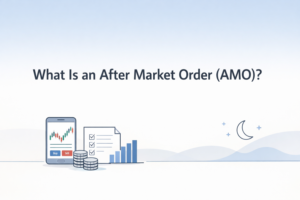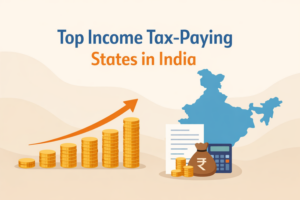What is the difference between BSE and NSE?

In popular understanding, stock exchanges provide the match-making infrastructure that enables daily trading in financial instruments such as stocks, bonds, and exchange-traded funds. However, stock exchanges have grown far beyond performing this basic function as they are often seen as proxies for the home country’s growing economic prowess. For instance, India’s stock market overtook Hong Kong’s in January 2024 to become the world’s fourth-largest equity market. In other words, the combined value of shares listed on Indian stock exchanges surpassed those listed in Hong Kong, driven by India’s expanding investor base, robust FII inflows, and healthy macroeconomic fundamentals. In this context, it would be informative to understand the differences between NSE and BSE, India’s leading stock exchanges.
The Indian equity market has two major stock exchanges: the Bombay Stock Exchange (BSE) and the National Stock Exchange (NSE). To be sure, all Indian stock exchanges are electronic platforms that offer a marketplace for trading and listing securities. Investors and traders are the main stakeholders in this process in which millions of shares and other financial instruments change hands daily, with the support of market participants such as brokers and depositories.
The function of BSE and NSE is to mobilize resources by providing a safe and secure trading platform. While their mandates are similar, BSE and NSE differ in terms of the number of stocks traded, liquidity, and trading volume.
Let’s understand the differences between NSE and BSE.
Bombay Stock Exchange (BSE)
BSE, founded in 1875 and headquartered in Mumbai, is the oldest stock exchange in Asia. BSE has played a prominent role in shaping India’s equity landscape.
BSE’s benchmark index Sensex consisting of 30 blue chip stocks from 10 sectors was launched in 1986. Apart from Sensex, BSE has other indices such as BSE 100, BSE 200, BSE Midcap, and BSE Auto.
The BSE Sensex is a widely used metric to gauge the mood of the Indian equity market.
Fun fact: BSE is now a listed company on NSE. That is BSE’s share trades only on the NSE.
National Stock Exchange (NSE)
The National Stock Exchange was established in 1992, making it a lot younger than the Bombay Stock Exchange. While NSE is younger, it is still one of the largest stock exchanges in Asia by volume.
NSE’s benchmark index Nifty 50, comprising the top 50 widely traded stocks, was launched in 1995-96. It was also the year in which NSE started trading and settlement in dematerialized securities. The technologically advanced dematerialized format changed the landscape of the Indian equity market as it boosted trading safety and led to increase in trade volume.
Apart from the Nifty 50 index, the NSE also has thematic and sectoral indices such as Nifty100, Nifty MidCap, and Nifty Bank.
BSE vs. NSE: Differences at a glance
Here is a side-by-side comparison of BSE and NSE to help you understand India’s two prominent stock exchanges better.
| Points of Difference | NSE | BSE |
| Established | 1992 | 1875 |
| Managing Director & CEO | Ashishkumar Chauhan | Sundararaman Ramamurthy |
| Benchmark Index | Nifty 50 | S&P BSE Sensex |
| Listed Companies (numbers change when new companies are listed or unlisted) | Around 1,600 | 5,500 |
| Market Capitalization | Rs. 416.57 lakh cr | Rs. 446.61 lakh cr |
| Liquidity | As the trading volume of the NSE is very high, NSE has higher liquidity. | BSE has comparatively lower liquidity. |
| Global Rank | 6th | 7th |
| Trading Volume | Very High | Lower in comparison to NSE |
| Electronic Trading Platform | NSE started the electronic trading platform right when it was founded in 1992. | BOLT (BSE Online Trading) was incorporated by BSE in 1995. |
| Products traded on the exchanges | Equity Stocks, Equity derivatives, Offer for Sale, Mutual Funds, Currency Derivatives, Commodity Derivatives, Corporate Bonds, Security Lending & Borrowing Scheme, Institutional Placement Program | Equity Stocks, Equity derivatives, Offer for Sale, Mutual Funds, Currency Derivatives, Commodity Derivatives, Corporate Bonds |
| Website | www.nseindia.com | www.bseindia.com |
NSE vs. BSE: Which exchange should investors prefer for transaction?
We have seen the difference between NSE and BSE. As a retail trader or investor, both exchanges offer almost identical benefits and services. The choice of exchange would depend on the equity listing.
You will have to choose BSE if you want to trade only in BSE-listed stocks and opt for NSE if you want to trade only in NSE-listed stocks.
The exchanges offer the same level of security and investor protection. Thus, NSE and BSE are deemed equal when it comes to choosing an advanced, secure exchange.
Disclaimer
The stocks mentioned in this article are not recommendations. Please conduct your own research and due diligence before investing. Investment in securities market are subject to market risks, read all the related documents carefully before investing. Please read the Risk Disclosure documents carefully before investing in Equity Shares, Derivatives, Mutual fund, and/or other instruments traded on the Stock Exchanges. As investments are subject to market risks and price fluctuation risk, there is no assurance or guarantee that the investment objectives shall be achieved. Lemonn (Formerly known as NU Investors Technologies Pvt. Ltd) do not guarantee any assured returns on any investments. Past performance of securities/instruments is not indicative of their future performance.







